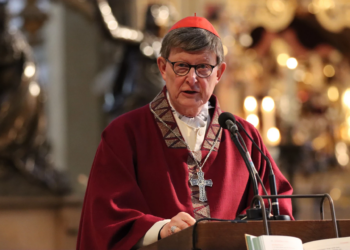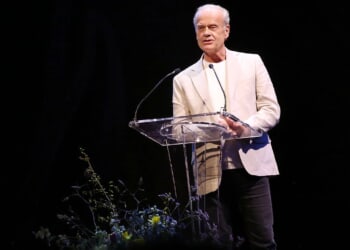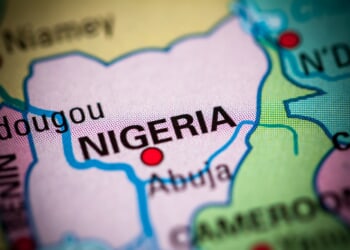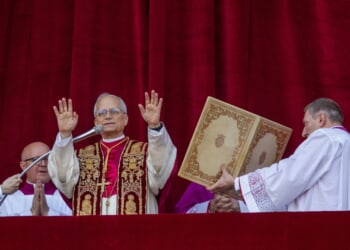Washington, D.C. Newsroom, Jun 4, 2025 /
16:29 pm
Bishop Robert Barron sat down with conservative political commentator Tucker Carlson this week to talk about the Catholic faith and discuss some hot cultural topics. Carlson, an Episcopalian, began the June 2 interview by saying that his friends urged him to have Barron on his show.
“I don’t think I’ve ever received more texts about any guest than I did about you,” Tucker told Barron. “From Catholics I know, from non-Catholics I know.”
Barron, founder of Word on Fire Catholic ministries and bishop of the Winona-Rochester Diocese in Minnesota, and Carlson discussed a wide range of subjects, including how to find happiness, prayer, grace, persecution, technology, and the future of the Church.
Finding happiness
The interview began with a discussion about happiness. Carlson cited falling birth rates and increased suicides as evidence of a widespread lack of happiness in the culture.
“The joy of life” comes when “you forget about yourself and you lose yourself in some great value,” Barron said.
“God is the highest good, the ‘summum bonum.’ That’s why you love the Lord your God. That’s the First Commandment. But when the culture has lost that, which ours is in danger of, you, by definition, become unhappy,” Barron said.
In order to find happiness, people must let go of their egos and pursue “the good,” he said. “The ego is like a black hole … that will draw everything into itself, suck all of life and light and energy into itself. Nothing can escape.”
People who feel unhappiness have “lost a sense of God” and therefore lost “the supreme good,” according to Barron. “The best people are those who breathe life into a room. And that happens because they’re not preoccupied with the ego. They’re captivated by some objective good, and they want to show it to you.”
What is true freedom?
The discussion turned to the topic of freedom.
If we focus too much on choices in our lives, we will “get lost,” Barron said.
“I thought the whole point of the West was choices,” Carlson responded.
“But, you have to know what your choice is for,” Barron said. “When you deify choice itself, when you say, ‘Autonomy, that’s my God.’ No, choice is for some good.”
He continued: “The idea is to order freedom. Freedom is not an end in itself. Freedom is ordered towards some good. When it’s disordered, it tends to collapse in upon itself.”
“The whole point of America, I thought, was choice and freedom for its own sake,” Carlson responded.
(Story continues below)
Subscribe to our daily newsletter
“Well, and I would argue it’s not for its own sake,” Barron said. “If that happens to us, something’s gone wrong.”
Of the founding fathers, Barron said they didn’t “have the full Catholic imagination as I would like it, but they certainly had a sense of the objective good, and that the purpose of life is to find that good and be ordered toward it.”
“An ordered freedom is what they were interested in, not freedom for its own sake.”
“Your freedom has to be disciplined and directed,” he continued.
“Our culture, it’s … banks to a river, the river has energy. It’s going somewhere. You knock down the banks. You say, ‘Oh, I don’t want to be limited. Don’t set limits to my freedom.’ It just floods the fields.”
When asked by Carlson what are the banks that we’ve demolished, Barron said: “The life of the mind, the moral good, religious good, aesthetic … When that’s lost, the banks are knocked down.”
Barron explained: “The goal for the Bible is not autonomy, it’s theonomy.”
“God, ‘theos,’ … becomes the law of my life … When God becomes the norm of my life, I become more myself. I find who I really am. If I jettison God and I say, ‘No, I’m the leader of my own life,’ I get lost.”
“What does Jesus say? ‘The one who loses himself will find it. The one who’s trying to hang on to himself is going to lose it.’ Lose your freedom in God’s greater freedom, and you become now authentically free.”
Prayer and God’s transcendence
Barron spoke of prayer as a way to let go of ego. “Prayer is a conscious exercise in overcoming autonomy. It’s a conscious exercise to say, ‘I want to get out of my preoccupations. I’m placing myself in the presence of God.’”
Prayer is a way to “overcome” and “calm the mind,” Barron explained. He highlighted that the rosary is a “meditative prayer” that can really help the mind “open up to a deeper consciousness or a deeper awareness.”
When distraction occurs during prayer, Barron instructed people to “acknowledge” it. “Don’t try to fight it,” he said. “Acknowledge it and then go back.”
Related to the topic of the transcendent nature of God, Barron said: “You’re not going to find him in the world … you can’t say things like, ‘Oh, there’s no evidence for God,’ as though he’s a chemical reaction.”
“God is, at the same time, as transcendent as you can imagine, not a thing in the world, and as imminent as you can imagine. He’s higher than anything I could imagine, and he’s closer to me than I am to myself. Now, figure that one out,” Barron said.
When Carlson asked if God needs our sacrifice, Barron responded firmly: “He doesn’t require it.”
“How could the one who made the entire universe from nothing possibly need anything from it?” Barron said. “It’s just a logical contradiction.”
“He wants the openness of heart signaled by the sacrifice, because he wants us to be alive. And when we say, Lord, ‘I’m opening my heart to you. I’m ordering my life to you in this great sacrifice of praise,’ God delights because now we’re going to find the joy he wants us to have.”
God “needs nothing,” Barron said. “We eat the body and drink the blood of Jesus. We consume the sacrifice. It’s for our benefit, not for God’s.”
Christian persecution
During the interview, Barron highlighted the fact that the 20th century has been “the worst century for Christian martyrs [in] all of Christian history.”
“Now, around the world, we are by far the most persecuted religion,” he said. “It’s a crime. It’s an outrage. We talk in a demure way about religious liberty in our country, which is indeed under threat, but you want the real threat to religious liberty? It’s in different parts of the world. People are being killed for their Christian faith.”
Barron pointed to the late-19th-century Pope Leo XIII, who believed “the devil would have a unique control over the 20th century,” so he formulated “the famous St. Michael prayer … asking for the protection of Michael, the archangel.”
“It’s hard to argue” that Leo XIII’s premonition was not real, Barron explained. “If you believe in the devil, as I do, and you see what happened in the 20th century, it’s hard to imagine it wasn’t to some degree.”
Religion and violence
When asked if Christianity leads to violence, Barron said: “It’s one of the myths of enlightenment historiography that religion is the problem.”
There was a “careful study of all the great wars” conducted, Barron said. “And the conclusion was something like 8% could be traced to a religious cause.”
“There’s the totality of human dysfunction. God’s response to that is not to more violence. It’s to respond with forgiving love. That’s Christianity … It’s not a religion of violence,” he said.
Technology and faith
In the course of the more-than-hourlong interview, Barron and Carlson discussed digital technology, social media, and artificial intelligence.
“We’re all addicted to [them],” Barron said in reference to smartphones. “Those machines were designed to be addictive.”
He highlighted a program whereby priests have given up their phones for a whole year as a part of a study. Barron said the result was that “they all feel liberated.”
“They all come back saying, ‘It was the best year of my life, and I read books again, and I talked to people. I cultivated friendship. I played games. I played sports … That’s almost an illustration of Augustine’s ‘incurvatus in se,’ that I’m ‘caved in’ over my iPhone.”
Barron mentioned another study that found a “direct correlation between screen time and depression,” which he said he finds “perfectly plausible.”
“Look how unhealthy it’s making our young kids,” Barron said. “I think taking those things out of the hands of our kids would be a great idea, at least to some degree.”
Later in the interview, however, Barron said “technology is not bad in itself.” It becomes a problem when “you couple technology with a sheer celebration of autonomy or a bracketing of God.”
Artificial intelligence is “frightening” Barron said. “It [has] to be grounded in a moral vision … or it will become a Frankenstein’s monster.”
We cannot try to “become God” and “decide to dictate terms to reality. It’ll turn on us and wreck us,” Barron said.
Pope Leo XIV and the future of the Church
When asked what changes Pope Leo XIV may make as the new pontiff, Barron said “I don’t know.” But he did share that he thinks the pope has “made some interesting gestures” so far.
Pope Leo’s use of Latin and his appearance in the mozzetta on the loggia after his election was a “gesture toward more traditional Catholics,” Barron said.
At the end of the interview, Carlson ran a paid advertisement of the Catholic prayer app Hallow, a sponsor of the podcast interview, offering listeners a three-month free trial with the code “TUCKER” at Hallow.com/Tucker and promoting the app’s consecration to Jesus through St. Joseph.


















